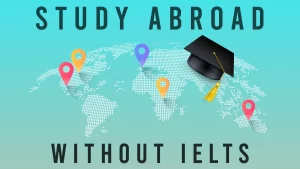Last Updated on January 19, 2026
Student Visa Rejection Reasons and How to Avoid Them
Applying for a student visa is one of the most important steps for studying abroad. While thousands of students successfully get their visas approved every year, many face rejections due to avoidable mistakes. A student visa rejection not only delays your study abroad plans but can also affect your confidence and future applications.
Understanding the top student visa rejection reasons and learning how to avoid them can significantly increase your chances of visa approval. Whether you’re planning to study in the USA, UK, Canada, Germany, France, or Australia, the rejection factors are often similar.
This blog highlights the common reasons for student visa rejection and provides expert strategies to avoid them, ensuring your study abroad journey is smooth.
1. Insufficient Financial Proof
Reason:
One of the leading causes of student visa rejection is the inability to show adequate financial resources. Visa officers need to be convinced that you can cover tuition fees, living costs, and other expenses without financial hardship.
How to Avoid:
- Maintain a clear bank statement history showing consistent funds.
- Present documents like sponsor letters, scholarships, or education loans.
- Ensure funds cover at least one year of tuition and living expenses (amount varies by country).
Tip: For example, to study in Germany, you must show a blocked account of €11,208/year, while in Canada, proof of CAD 20,635 is required.
2. Incomplete or Incorrect Documentation
Reason:
Missing documents, fake certificates, or incorrect forms can easily lead to a rejection. Each country has specific visa requirements, and failure to meet them raises red flags.
How to Avoid:
- Double-check the visa checklist provided by the embassy/consulate.
- Ensure your passport validity covers your entire study duration.
- Attach all supporting documents like admission letters, transcripts, SOP, IELTS/TOEFL scores.
- Seek professional guidance from study abroad consultants like GeoEdutech to avoid mistakes.
3. Weak Statement of Purpose (SOP)
Reason:
A poorly written SOP is a major cause of rejection. Visa officers want to understand your academic background, study goals, and career plans. A generic or unclear SOP may signal a lack of intent to return after studies.
How to Avoid:
- Write a personalized SOP highlighting your academic achievements, future career goals, and reasons for choosing that specific country and university.
- Explain how your program aligns with your long-term plans.
- Avoid plagiarism and keep it professional yet authentic.
Tip: Mention why you chose to study in Germany for engineering, or hospitality management in France, or MBA in Canada to show clarity.
4. Language Proficiency Issues
Reason:
How to Avoid:
- Take recognized language proficiency tests early.
- Aim for the required minimum score (e.g., IELTS 6.5+ for most universities).
- If applying to Germany or France, consider taking basic language courses for better acceptance.
5. Suspicion of Immigration Intent
Reason:
Visa officers must be convinced that you are a genuine student and not using education as a pretext for immigration. If your documents or answers suggest otherwise, rejection is likely.
How to Avoid:
- Clearly explain your academic and career goals in your SOP and visa interview.
- Show strong ties to your home country (family, property, career prospects).
- Avoid inconsistent answers during the student visa interview.
6. Academic Performance and Background
Reason:
Poor grades or a mismatch between past education and the chosen program can raise doubts about your eligibility.
How to Avoid:
- Choose a course that aligns with your academic background and career path.
- Highlight extracurricular achievements and certifications in your application
- Provide justification if there is a gap year (internship, work experience, or skill-building).
7. Previous Visa Rejections
Reason:
If you’ve had a previous visa rejection, it may affect your new application, especially if the reasons remain unaddressed.
How to Avoid:
- Understand why your previous application was rejected.
- Correct mistakes in your new application.
- Attach a cover letter explaining improvements.
8. Inconsistent Information in Application
Reason:
Discrepancies between your application, documents, and visa interview answers can lead to suspicion.
How to Avoid:
- Be consistent with all details—financials, education, and goals.
- Practice your visa interview thoroughly.
- Submit authentic documents only.
9. Choice of Course and University
Reason:
If the chosen course seems irrelevant to your profile or the university is not recognized, visa officers may reject the application.
How to Avoid:
- Select recognized universities and accredited programs.
- Justify why you chose a particular country and course.
- Link your chosen program to your career development plan.
10. Poor Visa Interview Performance
Reason:
Many students fail their student visa interview due to nervousness, lack of preparation, or unclear answers.
How to Avoid:
- Prepare for common visa interview questions:
- Why did you choose this country/university?
- How will you fund your studies?
- What are your career plans after graduation?
- Why did you choose this country/university?
- Practice with a consultant or mentor.
- Stay confident, clear, and concise.
How to Increase Your Student Visa Approval Chances
- Start preparing early and apply within the deadlines.
- Research visa requirements for the USA, UK, Canada, Germany, France, and Australia carefully.
- Take professional guidance from trusted consultants like GeoEdutech, who specialize in student visas and study abroad guidance.
- Maintain a strong academic and financial profile.
- Be genuine and honest in your SOP, documents, and interviews.
Conclusion
Getting a student visa approved is as important as securing university admission. While student visa rejection reasons vary from financial proof to weak SOPs, most of them are avoidable with proper planning.
If you carefully prepare your documents, meet language and academic requirements, and present a clear study plan, you can significantly increase your chances of visa success.
At GeoEdutech, we specialize in guiding students through the entire process—university selection, SOP writing, financial documentation, and visa interview preparation—to ensure your study abroad dream comes true without hurdles.
FAQ
What are the top reasons for student visa rejection?
The main reasons include insufficient financial proof, incomplete documents, poor SOP, weak language scores, suspicion of immigration intent, and poor visa interview performance.
How can I avoid student visa rejection?
Prepare strong financial documents, write a clear SOP, meet language requirements, and be consistent in your application.
Can I reapply after student visa rejection?
Yes. You can reapply, but you must address the previous rejection reasons and strengthen your application.
Does a student visa rejection affect future applications?
Yes, multiple rejections can affect your credibility. Always correct errors before reapplying.
Which country has the lowest student visa rejection rate?
Countries like Germany, Canada, and Australia generally have transparent visa processes, but approval depends on your application quality.
Is SOP important for student visa approval?
Yes, a strong SOP highlights your genuine intent to study and return, making it crucial for approval.






